Tait Founding Patrons
Dame Joan Sutherland AC OM DBE
(1926 – 2010)
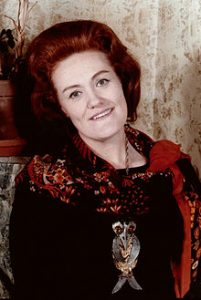
Dame Joan Sutherland was one of the world’s greatest operatic divas. After winning the Mobil Song Contest in 1950, Sutherland left Australia to study at the Royal College of Music in London, making her debut at Covent Garden in 1952 in The Magic Flute. Within a few weeks she was appearing there in Norma, with Maria Callas in the title role.
In London a fellow expatriate, conductor Richard Bonynge, became her mentor and later her husband. He encouraged her to abandon the heavier vocal roles she favoured and to become a coloratura soprano; the transformation was key to her success. Sutherland’s 1959 performance in Lucia di Lammermoor at Covent Garden launched an international career that spanned nearly 40 years, during which her distinctive voice, immense vocal range and wide repertoire earned her the title ‘La Stupenda’. Luciano Pavarotti described her voice as ‘certainly the greatest voice this century’.
She was Australian of the Year in 1961, the second year the title was awarded. Thirty years later she received the Order of Merit, one of a mere handful of Australians – and the only Australian woman – to be accorded that honour. In 1974, Sutherland and Bonynge returned to Australia, and over the next decade they lent their star power to the Australian Opera. In the years following, she was designated a National Living Treasure. Sutherland lived in Switzerland for many years. When she died, it had been more than 20 years since the night of her last performance, at Covent Garden. She was the first Australian to have been given a memorial service at Westminster Abbey since that of Sir Robert Menzies in 1978.
Viola, Lady Tait AM
(1911 – 2002)
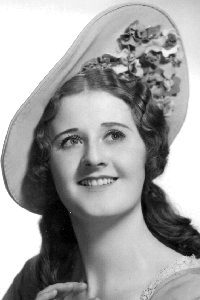
Born in Pressburg, Austria-Hungary where her father was the manager of a branch of J P Coats thread mills. The family returned to Paisley, in Scotland, with the outbreak of World War I.
She enrolled in the in the Scottish National Academy of Music in Glasgow, then studied singing under Francis Harford before joining the Carl Rosa Opera Company in 1935 and played at the London Lyceum Theatre and touring South Africa.
In 1937 she joined the D’Oyly Carte Opera Company as a principal soprano, touring the English provinces and later America. In 1939 she was invited to join the Australian Gilbert and Sullivan Opera Company as a principal for a year long tour of Australia and New Zealand.
She met and married Frank (later Sir Frank) Tait, the youngest of the five Tait brothers.
Her first book A Family of Brothers provides a history of the J C Williamson’s theatre enterprise and the contribution of the Tait brothers to Australian theatre. This was followed by Dames, Principal Boys…and all That: A history of Pantomine in Australia in 2001.
John McCallum AO CBE
(1918 – 2010)
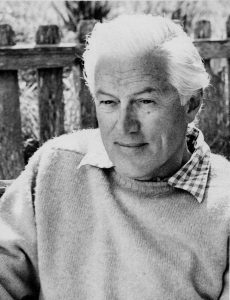
John McCallum, actor, director, producer and writer, was born on March 14th 1918 in Brisbane, the first son of the producer and accomplished musician John McCallum (Senior), who owned and ran The Cremorne Theatre in Brisbane.
Educated in Switzerland, England and Australia, (Knox Grammar School in Sydney and The Anglican Church Grammar School, Brisbane), in 1936 he set off for London, ostensibly bound for a diplomatic career via New College Oxford; but chose instead to go to RADA where he won a scholarship. Beginning in weekly rep, his early career included seasons with both The Old Vic and Stratford before he sailed for Australia at the outbreak of war, to serve with the AIF in New Guinea.
Returning to the UK in 1947, John won a film contract with Rank, starring with Phyllis Calvert, Margaret Lockwood, Michael Wilding, Orson Wells – and Googie Withers, whom he married in 1948. During this period, he played leading roles in more than twenty films, including The Root of All Evil, The Loves of Joanna Godden, It Always Rains on Sunday, Miranda, The Woman In Question, Trent’s Last Case and The Long Memory. He also starred in numerous theatre productions, and during 1955 he and Googie toured Australia and New Zealand for JC Williamson’s in Simon and Laura and The Deep Blue Sea. John had directed both productions, and 1958 he followed in his father’s footsteps when Sir Frank Tait invited him to become a Theatrical Producer and join “The Firm”, as Joint Managing Director. At that time JC Williamson’s was the largest theatrical organisation in the world, owning nine theatres, operating in thirteen and mounting all its own productions. The two men worked very happily together for nine years, and John and Googie and their three children made Melbourne their home. On Sir Frank’s death in 1965, John became Managing Director, shortly after the culmination of Sir Frank’s dream – the Sutherland Williamson Grand Opera Season.
Over his years with Williamson’s, John directed and produced a string of hugely successful musical comedies; among them My Fair Lady, Camelot, Hello Dolly, How to Succeed In Business Without Really Trying, and Funny Girl, along with many straight plays. A champion of Australian talent, he cast and nurtured young stars to be, including Kevin Colson, Nancy Hayes and Jill Perryman. He also presented in Australia famous overseas solo artists such as Yehudi Menhuin, Victor Borge, Jack Benny, Danny Kaye and Harry Belafonte. He helped establish the Australian Ballet, and in 1966 took Williamson’s into film production with They’re a Weird Mob.
On leaving Williamson’s, John moved into film and television production. Setting up Fauna Productions, he co-created and produced the TV series Skippy, which became an international success. Generating ninety-one episodes, it was shown in over 120 countries. In all, John was involved in producing, directing and writing over 200 episodes for television, since Skippy was followed by the series Barrier Reef, Boney, Shannon’s Mob, and Baily’s Bird. He also produced several feature films, including The Highest Honour and Attack Force7, which starred Mel Gibson.
In 1971 he received a CBE for services to the performing arts. He was made an Officer of the Order of Australia in 1992, and was President of the Australian Producers and Directors Guild, and President of the Australian Film Council.
Regularly returning to act on stage, his first love, he often travelled to England to star with Googie at the Chichester Festival Theatre, and several of the productions transferred to the West End, where earlier he and Ingrid Bergman had starred together in The Constant Wife. John and Googie toured Europe with The School for Scandal; the Middle East with The Kingfisher, and the UK with On Golden Pond, later touring Australia with the two-hander, High Spirits, a piece he both wrote and directed. His memoir, Life With Googie, was published in 1976.
John’s last stage appearance was in 2002 with Googie at the Theatre Royal Haymarket in Sir Peter Hall’s production of Lady Windermere’s Fan. He died on the 3rd February 2010 at the age of 91.
Sources: Sixty Voices and Double Act, both by Brian McFarlane; Oxford Dictionary of National Biography (article researched and written by Alex Jennings); Life With Googie, the autobiography by John McCallum.
Googie Withers AO CBE
(1917 – 2011)
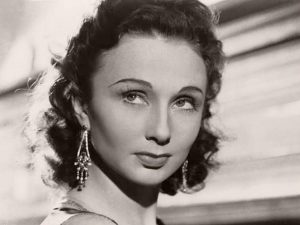
Just 73 years after her London début in 1929, the great Googie Withers (born Georgette Lizette Withers in Karachi, India), was starring in London’s West End in Lady Windermere’s Fan. In between those dates, she created as indelible an impression as any actress ever has in British films, as well as working extensively on stage and TV.
She began as a dancer and had little formal theatrical training, and this may help to account for the absolute ease with which she commanded the screen. Starting out, she had small, principally comedic, roles in about 30 minor films from the mid 1930s, but was lucky enough to be in four of Michael Powell‘s “quota quickies“, starting with her début in The Girl in the Crowd (1934) – and he was lucky to have her. Even then, she stood out from the artifice around her, with a wit and boldness, an intelligent sensuality which would make her virtually unique in British films of the period.
She also had a small part in the charming opening sequences of Hitchcock’s The Lady Vanishes (1938); before Powell gave her her first serious dramatic role , playing a Dutch patriot (her mother was in fact part-Dutch) in One of Our Aircraft Is Missing (1942); and in 1943 this was followed by The Silver Fleet, in which she stared with Ralph Richardson. She reprised her stage lead in Ealing Studio’s film version of the J.B. Priestley play, They Came to a City, and more than held her own with Clive Brook, Roland Culver and the incomparable Beatrice Lillie in the high comedy, On Approval (1944); and seized centre screen with Pink String and Sealing Wax (d. Robert Hamer, 1945), as a Victorian pub landlady with murder on her mind.
There was no other contemporary actress who so persistently created women of purpose, whether ruthless as in Night and the City (d. Jules Dassin, 1950), selfless like Dr Sophie Dean in White Corridors (1951), or as the dedicated sheep farmer in The Loves of Joanna Godden. Perhaps best of all was the complex, flawed Rose in It Always Rains on Sunday (d. Robert Hamer, 1947), who finally settles for dull domesticity, having experienced the destructive effects of passion.
Film studios were closing in the UK in the mid 1950s and she accompanied her husband, John McCallum, with whom she had often co-starred, to Australia, where he had accepted the post of joint managing director of J.C. Williamsons, the leading theatre producers in Australasia. John and Googie spent the next 50 years commuting between the stages of the two countries.
In 1952 Googie had scored two great successes in London’s West End: as Georgie Elgin in Clifford Odet’s Winter Journey alongside Michael Redgrave and Sam Wanamaker, and as Hester Collyer in Terrance Rattigan’s The Deep Blue Sea. In 1958 she embarked on a season at The Memorial Theatre at Stratford (later known as the RSC) playing a beguiling and witty Beatrice in Much Ado About Nothing to Michael Redgrave’s Benedick and, although nine years his junior, Gertrude to his Hamlet. Three years later they teamed up again, this time on Broadway in New York for a production of Graham Green’s play The Complaisant Lover.
1963 found her back in London with Alec Guinness at The Royal Court Theatre in Eugene Ionesco’s Exit The King, indeed between the late 1960’s and the early 2000’s modern classics would dominate her stage work, including (in Australia): Woman in a Dressing Gown, The Constant Wife, Beekman Place, Plaza Suite, The First Four Hundred Years with Keith Michell (a compilation of excerpts from Shakespeare’s plays), and Alan Ayckbourne’s Relatively Speaking, while in Chekhov’s The Cherry Orchard she was a splendid Madam Ranevksy. In the UK, Googie gave notable performances in Bernard Shaw’s Getting Married at The Strand Theatre London and Somerset Maugham’s The Circle with John McCallum at The Theatre Royal, Haymarket. Among the parts she played at the Festival Theatre in Chichester were Wilde’s Lady Bracknell, Lady Markby and The Duchess of Berwick in revivals of The Importance of Being Earnest, An Ideal Husband and Lady Windermere’s Fan.
During this time she also appeared in several films in Australia including Country Life and Shine, and in some notable TV series in Britain, where she starred for several seasons as the Prison Governor in Within These Walls (LWT, 1974-78) as well as a host of prestigious one-off dramas.
She was appointed an Officer of The Order of Australia in 1980 and awarded a CBE in 2001.
Googie Withers died in Sydney on July 15th 2011. In November of that year a memorial was held at St Paul’s Church, Covent Garden.
Biography: My Life With Googie by John McCallum (1979).
Brian McFarlane, Encyclopedia of British Cinema
The Oxford Dictionary of National Biography (researched and written by Alex Jennings)
Tait Patrons
Leanne Benjamin AM OBE
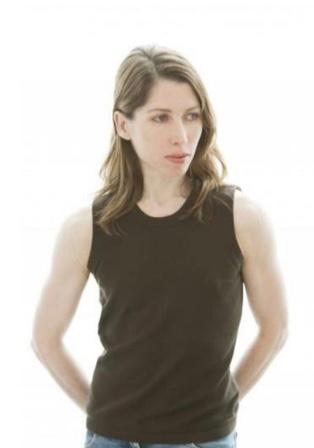
Leanne Benjamin was born in Rockhampton, Australia. At 16 she joined The Royal Ballet School winning the Adeline Genée gold medal and the Prix de Lausanne and she performed the role of Giselle at Covent Garden in the Royal Ballet School’s annual performance.
Leanne joined Sadler’s Wells Royal Ballet in 1983, English National Ballet in 1988 and the Deutsche Oper Ballet Berlin in 1990 before joining the Royal Ballet in 1992 at Kenneth MacMillan’s invitation, where she performed as a principal dancer for 21 years.
Her wide repertory included most of the classical and neo-classical repertoire. She created new roles for choreographers including, Wayne McGregor, Alexei Ratmansky, Christopher Wheeldon and Twyla Tharp and was one of the last dancers to work with Ninette de Valois, Frederick Ashton and Kenneth MacMillan.
In 2004 and 2009, Leanne was recognised as Best Female Dancer in the Critic’s Circle Dance Awards and in 2013 she was given the De Valois Award for Outstanding Achievement in Dance.
In 2005 Leanne received an OBE in recognition of her services to dance, in 2014 an Honorary Doctorate of Performing Arts by Central Queensland University and in 2015 she was appointed a Member of the Order of Australia.
In 2016 Leanne was appointed a Governor of The Royal Ballet Companies. She assumed the office of Vice-Chair of Governors in 2019.
Leanne is the Patron of the Tait Memorial Trust where an annual award is given in her name to support young Australian Dancers to train in the UK. She is now coaching pre-professional students and working with a number of international ballet companies as a coach to their principal dancers.
Source: The Royal Ballet website
Julian Gavin
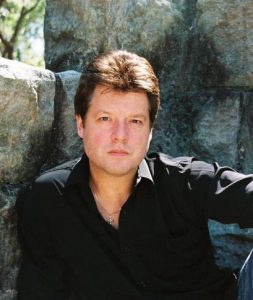
Australian born tenor Julian Gavin graduated from the University of Melbourne and undertook postgraduate studies in conducting at the Victorian College of the Arts before coming to London where he studied at the National Opera Studio.
His U.K. debut as Alvaro in LA FORZA DEL DESTINO for ENO led to a series of engagements for the company including roles such as Alfredo/LA TRAVIATA, Il Duca/RIGOLETTO, Rodolfo/LA BOHEME, Cavaradossi/TOSCA, and the title roles in THE TALES OF HOFFMANN, ERNANI and TROVATORE. Elsewhere his operatic appearances include Laca/JENUFA, Carlo VII/GIOVANNA D’ARCO (Opera North, Frankfurt). The title role in Luc Bondy’s production of DON CARLOS conducted by Bernard Haitink, for the Royal Opera House Covent Garden, a role which he repeated at the 1998 Edinburgh Festival, Pollione/NORMA (Lucerne, Michigan) Alfredo/TRAVIATA (Den Norske Oper, Opera Australia, Washington National Opera), Rodolfo/LA BOHEME (Trieste, Stuttgart, De Vlaamse Opera, Opera North), Rodolfo/LUISA MILLER (Essen, Bordeaux), Pinkerton/MADAMA BUTTERFLY (Deutsche Oper Berlin, Opera North, State Opera South Australia), Des Grieux/MANON LESCAUT (Israel Philharmonic Orchestra conductor Daniel Oren), Hoffman/ THE TALES OF HOFFMANN (Washington, Vienna), Cavaradossi/TOSCA (Opera Colorado, ENO), Don JosÈ/CARMEN (Opera Australia, Kansas Symphony Orchestra, Stockholm, Z˙rich with Michael Plasson, Teatro Real, Madrid with Alan Lombard, Vienna State Opera, Duetsche Oper Berlin, Opera Colorado, ENO), Roméo/ROMÉO ET JULIETTE (Opera Australia), DON CARLO (Minnesota Opera, New Israeli Opera, Opera North, Calaf/TURANDOT (SOSA) ANDREA CHENIER/title role (Essen, Lyric Opera Queensland, Chelsea Opera Group, Graz, Liége) Cavaradossi/TOSCA (English National Opera, Opera Colorado),Des Grieux MANON (Opera North, Opera Australia), Dick Johnson/LA FANCIULLA DEL WEST (New Israeli Opera, Opera de Montreal), Duke/RIGOLETTO for Opera Colorado, Jenik/THE BARTERED BRIDE at Glyndebourne Festival Opera, Edgardo/LUCIA DI LAMMERMOOR (Opera Queensland, Gustavo/UN BALLO IN MASCHERA (Boston Lyric Opera, Bordeaux, Opera Australia) The Prince/RUSLALKA (Opera Australia), Avito/L’AMORE DEI TRE RE Opera Holland Park.
In concert, Julian Gavin has performed a wide-ranging repertoire with major Orchestras throughout the world including appearances with the Philharmonia, the Sydney Symphony Orchestra under Edo de Waart, National Symphony Orchestra under Leonard Slatkin, London Philharmonic, BBC National Orchestra of Wales under Andrew Litton, Halle Orchestra under Mark Elder, BBC Symphony and many others.
He has recorded ERNANI and CARMEN for Chandos, Godvino in AROLDO and a new recording of Beethoven’s Symphony No. 9 for Philips, the rarely heard Bizet opera IVAN IV with Orchestre National de Radio France (including concert performance) – in addition to numerous television and radio broadcasting credits in the UK, Australia and America.
Now a British Citizen, Julian lives in London together with his wife and five children. Julian has a thriving teaching practice and has given numerous master classes, both at home and internationally. Julian joined the teaching staff at the Guildhall School of Music & Drama in 2008.
John Frost AM
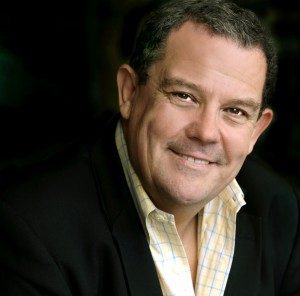
John Frost AM is the Managing Director of the Gordon Frost Organisation (GFO). He began his career at age 16 as a dresser on the J.C. Williamson tour of Mame and worked his way through the ranks to become one of Australia’s most prominent musical theatre producers. He co-founded GFO with the late Ashley Gordon in 1983. After negotiating the lease for Sydney’s Footbridge Theatre, they produced a number of shows including Jerry’s Girls, Night Mother, The Venetian Twins and Women Behind Bars. The company then moved onto national tours of large-scale musicals such as Big River, The King And I, South Pacific, Hello Dolly!, The Secret Garden, Smokey’s Joe’s Café, Cabaret and Crazy For You. In 1996, the GFO production of The King And I won the Tony Award for Best Revival of a Musical on Broadway. Two years later, John co-produced Grease – The Arena Spectacular!with Sports and Entertainment Ltd (SEL). Then came The Sound of Music starring Lisa McCune, Annie with Anthony Warlow, Man of La Mancha, The Wizard of Oz and Footloose. In 2003, he won his second Tony Award as a co-producer of Hairspray on Broadway. John subsequently co-produced The Producers around Australia and another arena production of Grease starring John Farnham. In partnership with The Really Useful Company Asia Pacific, he presented the Australian tour of The Phantom of the Opera starring Anthony Warlow and was one of the producers of Priscilla, Queen of the Desert in London. In recent years, John produced Australasian tours of Chicago, Doctor Zhivago and Wicked, as well as Australian tours of Fame the Musical, Legally Blonde. In Melbourne, he produced A Funny Thing Happened on the Way to the Forum starring Geoffrey Rush and Once. In London, he coproduced the West End productions of The Bodyguard and Blithe Spirit, while in the US he coproduced Blithe Spirit, An Act of God and Fiddler on the Roof. In partnership with Opera Australia, John has co-produced South Pacific, The King and I and Anything Goes. In 2015, he also toured The Rocky Horror Show, Wicked, Dirty Dancing and The Sound of Music. His productions for 2016 included We Will Rock You, Dream Lover – a new Australian musical about Bobby Darin, and My Fair Lady with Opera Australia, directed by Julie Andrews. Over the years, John has presented many plays in Australia including, among others, the Tony Award-winning Art starring Tom Conti, the National Theatre of Great Britain’s celebrated production of An Inspector Calls and Driving Miss Daisystarring Angela Lansbury and James Earl Jones. He was awarded the prestigious JC Williamson Award for his outstanding contribution to the Australian live entertainment and performing arts industry at the 2014 Helpmann Awards. For his contribution to the Arts he was awarded an AM in the 2014 Queen’s Birthday Honours and in 2016 received an honorary doctorate from Griffith University. Productions for 2017 will include the Broadway smash The Book of Mormon,
Barry Humphries AO CBE
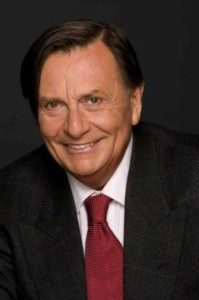
Barry Humphries is an Australian actor best known for his character Dame Edna Everage, a sharp-tongued housewife and talk show host. Humphries attended Melbourne University but left to pursue acting. He made his theatrical debut in 1953 at the Union Theatre in Melbourne and subsequently toured with a theatre company. His London stage debut was in The Demon Barber (1959), and he later appeared in various productions of the musical Oliver! as well as in several one-man stage shows.
In 1955 he created the character Edna Everage for a skit he was performing. Humphries’ character arose out of his desire to lampoon the people and standards of his parents’ generation. Edna was at times condescending, insulting, and intrusive but still likable and sincere. While in character, Humphries refused to acknowledge Edna’s fictional status, claiming that “Barry Humphries” was her manager. However, in interviews given out of character, Humphries discussed Edna, as well as his various other incarnations, as fictional. According to his biographical accounts of Edna, she was “born” Edna Beasley and began performing anecdotal material at small venues in her hometown of Moonee Ponds, a Melbourne suburb. Like Humphries, she had four children.
Humphries debuted Edna to a wider audience on the first evening of television broadcasting in Australia in 1956. He first appeared as Edna on film in The Naked Bunyip (1970) and later played her in Sgt. Pepper’s Lonely Hearts Club Band (1978). The Edna character was made a “dame” on television in the 1970s in a spontaneous gesture by Australian Prime Minister Gough Whitlam. Humphries starred as Edna in numerous television specials, among them The Dame Edna Experience (1987), Dame Edna’s Hollywood (1991), Dame Edna Kisses It Better (1997), and The Dame Edna Treatment (2007). He added an additional layer to the character by playing other female roles while in the guise of Edna in films such as Nicholas Nickleby (2003).
Humphries toured in stage productions centred on his Edna character throughout his career. His first international success was Housewife, Superstar! (1976) in London, followed by A Night with Dame Edna (1978). In 1998 he premiered Edna: The Spectacle in England and took the show to the United States as well. Later tours included Dame Edna: The Royal Tour (1999), Dame Edna: Back with a Vengeance (1987; 2004), and Dame Edna: Live and Intimate in Her First Last Tour (2008).
In addition to Edna, Humphries created several other comic characters that attracted attention, such as Sir Les Patterson, a vulgar, drunken Australian politician, and Sandy Stone, a senile old man. Humphries acted in more conventional roles in an array of films, from the Beethoven biopic Immortal Beloved (1994) and the adaptation of a J.R.R. Tolkien novel The Hobbit: An Unexpected Journey (2012) to the animated feature Finding Nemo (2003), for which he provided the voice of Bruce the shark.
Humphries wrote several books as himself, including Barry Humphries’ Treasury of Australian Kitsch (1980); Women in the Background (1995), a novel about an Australian television star that in some ways mirrored his own life; and My Life as Me (2004), an autobiography. Humphries also authored several volumes in the guise of his characters. Books ostensibly by Edna include Dame Edna’s Coffee Table Book: A Guide to Gracious Living and the Finer Things in Life by One of the First Ladies of the World Theatre (1976) and her autobiography, My Gorgeous Life: The Life, the Loves, the Legend (1989).
Piers Lane AO

London-based Australian pianist Piers Lane stands out as an engaging and highly versatile performer, at home equally in solo, chamber and concerto repertoire. In great demand as soloist and collaborative artist, recent highlights include a performance of Busoni’s mighty piano concerto at Carnegie Hall, premieres of Carl Vine’s second Piano Concerto, written for him, with the Sydney Symphony and the London Philharmonic, and several sold-out solo recitals at Wigmore Hall.
Five times soloist at the BBC Proms in London’s Royal Albert Hall, Piers Lane’s concerto repertoire exceeds ninety works and has led to engagements with many of the world’s great orchestras including the BBC and ABC orchestras; the American, Bournemouth and Gothenburg Symphony Orchestras; the Australian Chamber Orchestra, Orchestre National de France, City of London Sinfonia, and the Royal Philharmonic, Royal Liverpool Philharmonic and Warsaw Philharmonic orchestras among many others. Leading conductors with whom he has worked include Andrey Boreyko, Sir Andrew Davis, Andrew Litton, Jerzy Maksymiuk, Marko Letonja, Vassily Sinaisky, Yan Pascal Tortelier and Antoni Wit.
He frequently performs at prestigious festivals: Aldeburgh, Bard, Bergen, Cheltenham, Como Autumn Music, Consonances, Huntington, La Roque d’Anthéron, Newport, Prague Spring, Ruhr Klavierfestival, Raritäten der Klaviermusik at Schloss vor Husum and the Chopin festivals in Warsaw, Duszniki-Zdroj, Mallorca and Paris, among them.
Piers Lane has recently been appointed as the new Artistic Director of the Sydney International Piano Competition of Australia. He has been the Artistic Director of the Australian Festival of Chamber Music since 2007 and also directed the annual Myra Hess Day at the National Gallery in London from its inception in 2006 until 2013. From this sprang his collaboration with actress Patricia Routledge on a theatre piece devised by Nigel Hess, exploring Dame Myra’s work throughout the Second World War. This show, entitled “Admission: One Shilling”, has been performed over 70 times, throughout the UK at many festivals and theatres and recently throughout Australia and Belgium.
Piers Lane’s discography of over 50 CDs includes much admired recordings of rare Romantic piano concertos, the complete Preludes and Études by Scriabin, transcriptions of Bach and Strauss, along with complete collections of concert études by Saint-Saens, Moscheles and Henselt, and transcriptions by Grainger. With the Goldner String Quartet, he has recorded Piano Quintets by Bloch, Bridge, Bruch, Dvorak, Harty, Elgar, Taneyev, Arensky and Pierné. Recent recordings have included a solo recording, “Piers Lane goes to Town”, concertos with the Adelaide Symphony Orchestra and sonatas with violinist Tasmin Little.
Piers Lane is in great demand as a collaborative artist. He continues his longstanding partnership with violinist Tasmin Little, clarinettist Michael Collins and the Goldner String Quartet. He has performed extensively with singers Cheryl Barker, Peter Coleman-Wright, Yvonne Kenny, and Markus Schäfer and has collaborated with Anne Sofie von Otter and Bengt Forsberg, Brett Dean, the Australian, Doric, Kodály, Medici, New Budapest, New Zealand, Prazak and RTE Vanbrugh String Quartets, and pianists Marc-André Hamelin, Hamish Milne, Kathryn Stott and Kathron Sturrock.
Many composers have written for Piers Lane and he has premiered works by Brett Dean, Dave Heath, Colin Matthews, Richard Mills, Carl Vine, Benjamin Wallfisch and Malcolm Williamson, among others. He gave the first performance in modern times of Parry’s Piano Concerto and Harty’s Piano Quintet, and has made many first recordings, including Elgar’s Impromptu, John Ireland’s Ballerina and Malcolm Williamson’s fourth Piano Concerto. He gave the centenary performance at the Proms of Sir Arthur Bliss’s Piano Concerto and, with the American Symphony and Leon Botstein, New York performances of Bliss and Czerny at Avery Fisher Hall in the Lincoln Center and Frank Bridge’s Phantasm at Carnegie Hall.
Piers Lane has written and presented over 100 programmes for BBC Radio 3, including the popular 54-part series, The Piano. He holds Honorary Doctorates from Griffith University, Brisbane, and James Cook University, Townsville. He was recently presented with the first medal from the Laza Kostic fund for promoting Serbian culture during difficult political times in the late 90s. In 1994, he was made an Honorary Member of the Royal Academy of Music, where he was a Professor from 1989 to 2007. He is President of the European Piano Teachers’ Association UK, Patron of the Australasian Piano Pedagogy Conference, the Old Granary Studio in Norfolk, the Tait Memorial Trust in London, the Youth Music Foundation of Australia and the Music Teachers’ Association and the Accompanists’ Guild in Queensland. He is a Trustee of the Hattori Foundation in London and Vice-President of Putney Music Club. In the Queens Diamond Jubilee Birthday Honours, he was made an Officer in the Order of Australia (AO) for distinguished services to the arts as pianist, mentor and organiser.
Highlights of the past season included performing with the London Philharmonic Orchestra and Andrew Manze, and a return to the Seoul Spring Festival of Chamber Music. He also gave over thirty performances in Australia, and performed throughout the UK, and in France and Belgium. Forthcoming highlights include performances at the Wimbledon Festival, at Carnegie Hall with the newly formed The Orchestra Now, and an extensive recital tour of Australia.
In the Queen’s Diamond Jubilee Honours, Piers was made an Officer in the Order of Australia for services to music.
Source: Piers Lane website
June Mendoza AO OBE
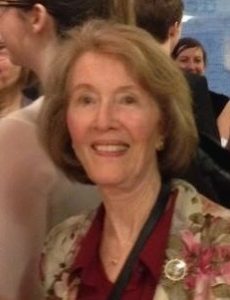
June Mendoza AO.OBE.RP.ROI. HonSWA is a member, amongst other art societies, of the Royal Society of Portrait Painters. She is one of the world’s foremost portrait painters. She undertakes commissions for portrait painting on a wide range of subjects, examples of which are displayed on this Internet gallery. Her commissioned work includes a number of portraits of the Queen and members of the Royal family, foreign dignitaries and a wide range of portraits of personalities from the Arts, Music, Government, Business and the professions. Her commissioned Group portraits include the House of Commons, the Australian House of Representatives, City Guilds and Boards of many companies and institutions.
Source: June Mendoza website
Danielle de Niese
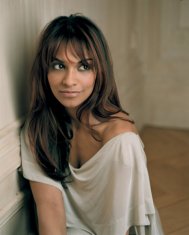
The Australian-born, lyric soprano, Danielle de Niese, was born in Melbourne, after her parents, Chris and Beverly, had migrated from Sri Lanka to Australia as teenagers – she is of Sri Lankan and Dutch heritage. In 1988, at the age of 9, she became the youngest ever winner of the Australian TV programme Young Talent Time, singing a Whitney Houston medley, for which the prize was A$ 5,000 and a Yamaha baby-grand piano, which she still possesses. In 1990, her family moved to Los Angeles. She has been captivating audiences since childhood, when she was a fixture of Los Angeles local television hosting a weekly arts showcase for teenagers, L.A. Kids, for which she won an Emmy Award at the age of 16. Trained in dance and piano as well as music at the famed Colburn School in Los Angeles, she participated in the Tanglewood, Aspen and Marlboro summer programmes before going to New York in 1997 to attend the Mannes School for Music.
Danielle de Niese made her professional operatic debut at the age of 15 with the Los Angeles Opera. Her career got off to a prestigious start when, at 18, she became the youngest singer ever to enter the Metropolitan Opera’s Lindemann Young Artist Development Program. A year later, at the age of 19, she made her house debut as Barbarina in a new Jonathan Miller production of Le nozze di Figaro in a cast featuring Renée Fleming, Bryn Terfel and Cecilia Bartoli, and led by James Levine. She was subsequently asked to perform the title role in the Met’s production of Maurice Ravel’s L’enfant et les sortilèges. Other Met roles include Cleopatra in Giulio Cesare (2007), Euridice in Orfeo ed Euridice (2009), and Susanna in the same production of Le Nozze di Figaro in which she sang Barbarina in 1998. The New York Times hailed De Niese’s performance, writing, “Her singing is utterly delectable and completely assured … Sheer ‘joie de vivre’ and mastery come spilling across, to the eyes as well as the ears.”
Soon after here Met debut, came important operatic debuts with the Netherlands Opera, Saito Kinen Festival and Paris Opera. But it was her portrayal of Cleopatra in a David McVicar production of George Frideric Handel‘s Giulio Cesare for her 2005 Glyndebourne Festival debut that brought her true international acclaim. She appeared in the same production at Glyndebourne also in 2006 and 2009, and at the Lyric Opera of Chicago in 2007. Danielle de Niese’s still growing career has ranged through early Baroque music (Poppea in L’incoronazione di Poppea), via G.F. Handel, W.A. Mozart and contemporary opera premieres (RAAFF by Robin de Raaff, 2004, De Nederlandse Opera) at major opera houses around the world, to Broadway (Les Misérables) and film (Hannibal) roles. She has appeared in productions of a number of Baroque operas on stage and on DVD, for example the Les Arts Florissants production of Les Indes galantes by Jean-Philippe Rameau. At the end of 2006, when De Nederlandse Opera staged the three Mozart/Da Ponte operas conducted by Ingo Metzmacher, de Niese sang Susanna in Le nozze di Figaro and Despina in Così fan tutte.
With her “sweet, gleaming soprano”, “phenomenal musicality” and “sharply comic, yet utterly moving” acting, combined with youth and physical presence, Danielle de Niese regularly graces many of the world’s most prestigious opera and concert stages. She has enjoyed operatic successes on the stages of the Paris Opera, Zürich Opera, Netherlands Opera, San Francisco Opera and Lyric Opera of Chicago, among many others. Orchestral engagements have included appearances with the New York Philharmonic Orchestra, Cleveland Orchestra, National Symphony Orchestra, San Francisco Symphony Orchestra and Academy of St Martin-in-the-Fields.
In the 2009-2010 season Danielle de Niese returned to the Metropolitan Opera in the same production of Le nozze di Figaro in which she made her house debut, but this time as Susanna. Other important opera engagements included L’incoronazione di Poppea with the Teatro Real, G.F. Handel‘s Semele at the Theâtre des Champs-Élysees, and Giulio Cesare at the Glyndebourne Festival, as well as Susanna in Le nozze di Figaro with the Lyric Opera of Chicago. Additionally, she toured Europe with the period-instrument ensemble Il Giardino Armonico in an all-Handel programme. Danielle de Niese’s 2010-2011 season began with appearances as Susanna in Le nozze di Figaro with the San Francisco Opera under Nicola Luisotti, continuing at the Metropolitan Opera as Despina in Così fan tutte, with William Christieconducting, and at Vienna’s Theater an der Wien in the title role of G.F. Handel‘s Rodelinda under Nikolaus Harnoncourt. She returns to the Glyndebourne Festival in June 2011 for her first performances as Adina in L’Elisir d’amore.
The Netherlands Opera awarded Danielle de Niese their “Prix d’Amis” as their audiences’ choice of the past season’s favourite performer. She has an exclusive recording contract with Decca. She is the recipient of the 2008 Echo Award’s New Artist of the Year, as well as the 2008 Orphee d’or given by the Academie du Disque Lyrique for her 2007 debut album, Handel Arias. Her much-lauded second recording, The Mozart Album, followed in 2009, and Diva was released in July 2010 in the UK. Beauty of the Baroque, an album of favourite arias from the English, German, and Italian traditions, accompanied by The English Concert under Harry Bicket, will appear in June 2011.
Danielle de Niese (called Danni by her friends and colleagues) married Gus Christie, chairman of Glyndebourne Festival Opera on December 19, 2009 in St Bartholomew-the-Great, London. Since her marriage she has lived at Glyndebourne in Sussex, England.
Source: Bach-Cantatas.com
Ermes de Zan
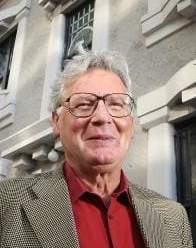
Awaiting biography
